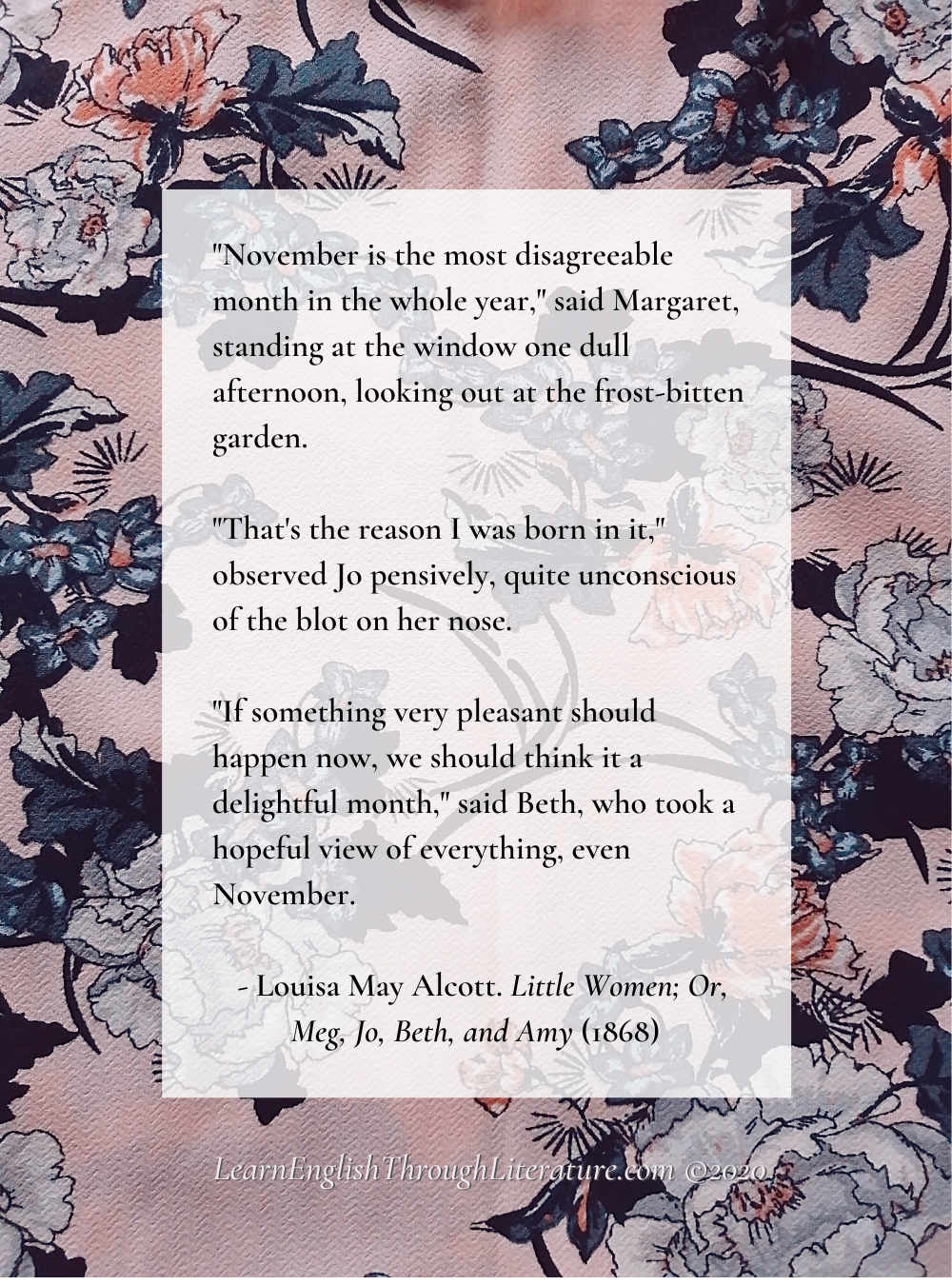🪔 “Yesterday was a quiet day, spent in teaching, sewing, and writing in my little room, which is very cosy, with a light and fire …”
– Louisa May Alcott, Good Wives (1869)
Here we continue our lesson by reviewing seven sets of key verb tenses and time words that often go together. In Part 1 of this lesson, we reviewed the Simple Present, the Present Continuous, the Present Perfect, and the Present Perfect Continuous.
In Part 2 of the Lesson, we are going to focus on the following as exemplified in Louisa May Alcott’s Little Women (1868) and Good Wives (1869):
– Past Simple
– Future Simple
– Future Continuous
And, as previously mentioned, the italicised highlights below (in the literary quotations) are my own.
…
PAST SIMPLE: e.g., I saw, you heard, she read, we spoke, you (plural) became, they went, etc.
TIME WORDS that are often used with this tense:
in (the past day, week, or year); yesterday; [number of] hours, days, weeks, years ago; last (month, week, or year), etc.
📙 A few days after the talk with her mother, Meg resolved to try a social evening with John …
📙 “I heard rumors about Fred and you last year …” (Laurie)
📙 They always looked back before turning the corner, for their mother was always at the window, to nod and smile, and wave her hand to them.’
📙 “I made a ‘pome’ yesterday, when I was helping Hannah wash; and, as father likes my silly little things, I put it in to amuse him.” (Jo)
– Louisa May Alcott, Little Women and Good Wives (first two quotations)
…
SIMPLE FUTURE: e.g., I will go, you will try, she will know, we will understand, you (plural) will say, they will do, etc.
TIME WORDS that are often used with this tense:
someday; tomorrow; in (a future week, month, year); on (a future day); next (event, weekday, month, week, year); this (afternoon, evening, week, month, year); [number of] days, weeks, months, years from now, etc.
📙 “I hope the third year from this will end better; I mean it shall, if I live to work out my plans,” said Mr. Brooke, smiling at Meg, as if everything had become possible to him now.
📙 “I’ll learn plain cooking for my holiday task; and the next dinner-party I have shall be a success.” (Jo)
📙 To-morrow I shall put away my ‘fuss and feathers,’ and be desperately good again,” she answered, with an affected little laugh. (Meg)
– Louisa May Alcott, Little Women
…
FUTURE CONTINUOUS: e.g. I will be studying, you will be doing, she will be singing, we will be talking, you (plural) will be resting, they will be travelling, etc.
TIME WORDS that are often used with this tense:
at this time tomorrow; by then; by this time next year; when …; once …, etc.
✍️ Of the seven combined ‘verb tense and time words’ sets mentioned in this lesson, that of the ‘future continuous tense and its time words‘ is probably the least commonly heard or used. This is because the future progressive tense applies in very specific situations, so it is probably worth memorising a few sample phrases to help you know exactly how to use it in your own English expression.
Since I have not been able to find any examples of it in Louisa May Alcott’s novels, I am instead taking two quotations that are in the simple future. I will then paraphrase them in the future continuous tense for you to see how they can accommodate time words.
📙 “I’ll talk for hours about them when I come, but haven’t time to write.”
📙 “You don’t care now, but there’ll come a time when that promise will keep you out of mischief, or I’m much mistaken.”
– Louisa May Alcott, Good Wives
Here are my versions, transposed from the simple future to the future continuous tense:
📝 I will be talking for hours about them when I come …
📝 You don’t care now, but there will be coming a time [later] when that promise will keep you out of mischief …
…
That completes our overview of the seven key tense and time structures that you should be aware of. You may have noticed that some time words can accompany more than one verb tense, so it is important to pay attention to the sentence’s context and meaning. That said, there is a lot of flexibility surrounding these combinations. As always, one of the best ways for you to really master these combinations is to read widely.
📜 I highly recommend Louisa May Alcott’s books, Little Women and (if you are hooked and want to read more about the March sisters) Good Wives, for the simplicity and style of their prose.
🍁 Thus concludes our lessons for the month of November, which I hope have been enjoyable as well as instructive. Lesson by lesson, we have been building up a foundation of basic grammatical concepts, vocabulary, and language comprehension, that will continue albeit on a less regular basis,over the coming month. So much to look forward to learning! To paraphrase Beth March’s observation (quoted in the feature image), if something very pleasant happens now, we should think it a delightful month! 🍂




